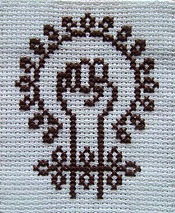
- W(h)ither “Feminism”: Why “post-feminist” identities and practices, and where did all the feminists go?
“Among women students—the next generation—‘feminist’ has already become a label many prefer to avoid. It is naïve to imagine (or pretend) that this is all due to media malice and misrepresentation. Clearly, academic feminism must begin to acknowledge and address its considerable problems…” (from Patai and Koertge p. xxiv)
Discussion: Why do you (or do you not) identify as a ‘feminist’, and what difference does that identification make or not make to your practices of (a) research and (b) of pedagogy?
In class reading: excerpt from Professing Feminism: Education and Indoctrination in Women's Studies (Patai and Koerteg, 1995, 2003) read preface to second edition, and first essay
Task for class#1: Students should identify a ‘way in’ to the question ‘whither feminism?” that they will pursue for their theoretical course paper
Assignment for next class: Students will form 3 groups, each of which will read the assigned articles on first, second or third wave feminism, and each group will add to the mix an article of their own choosing, and on the basis of their readings, will overview their assigned ‘wave’ to the class next week.
Jan 12th Class # 2
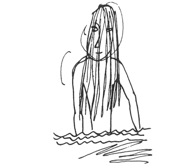

Not Waving but Drowning: http://www.youtube.com/watch?v=s8KIr98WDtc
First, second and third wave feminism
READINGS:
1. Rosalind Delmar “What is Feminism?”
2. Lynne Segal (1999) “Why Feminism”?
*plus, for each group, one of the following:
1st Wave: 1. Mary Wollstonecraft, Perkins-Gillman, John Stewart Mill & Simone de Beauvoir (introduction to Second Sex) and select/skim from pp1-158 in Kolmar and Bartowski
2nd Wave: Combahee River Collective, Audre Lorde, Monique Wittig, Adrienne Rich and select/skim from pp 159-332 in Kolmar and Bartowski
3rd Wave/World? & Global Feminisms:
Chandra Mohanty “Under Western Eyes: Feminist Scholarship and Colonial Discourses and skim from 333-561in Kolmar and Bartowski
see also Astrid Henry: Not my mother’s sister: Generational conflict and third-wave feminism
Student in-Class Activity: Doing “the wave/s”, in 3 acts
Jan 19th Class # 3 :

Visitor: Barbara Crow, Associate Dean of Research, Faculty of Liberal Arts and Professional Studies, York University will visit the class to speak about ‘Disciplining feminism: The locational politics of Women’s Studies, institutionalized”
READINGS: (Read first two papers (everyone), and then select/skim what you can manage from the rest)
1. B. Crow and L. Gotell, "What is Women's Studies?", Open Boundaries, third edition, 2008.
Wendy Brown “The impossibility of women’s studies” Differences, Vol. 9, 1997.
2. R. Wiegman. "“Feminism, Institutionalism, and the Idiom of Failure”." Women's Studies on the Edge (reprint, forthcoming 2008).
3. R. Wiegman. "The Possibility of Women's Studies." Women's Studies for the Future (2005): 40-60.
4. Wendy Robbins et al.(Ed) Minds of our own : Inventing feminist scholarship and women's studies in Canada and Quebec, 1966-76 Wilfrid Laurier University Press, 2008.
5. Ann Braithwaite et al. Troubling women's studies : pasts, presents and possibilities Sumach Press, 2004
Jan 25th Class #4
Dead White Feminists (and others in decline) : de Beauvoir and Beyond
“...those who fail to reread
are obliged to read the same story everywhere"
-- Roland Barthes, S/Z (1970)

http://womenshistory.about.com/library/etext/bl_gilman_yw.htm
READINGS:
1. Simone de Beauvoir, introduction to The Second Sex
2. Simone De Beauvoir and The Second Sex: Fifty years on
3. Donna Haraway, Cyborg Manifesto and other excerpts
4. Judith Butler: Gender Trouble (p.p. vii-44); Bodies that matter (excerpt)
5. Eve Sedgewick, Epistemology of the Closet (Introduction and excerpt)
Feb. 2nd Class #5:.
Brown Out: Re-energizing feminism from the ‘margins’: feminists of colour and queer
Visitor:

1. Feminism Meets Queer Theory (Schor and Weed, Eds. 1997)
Butler: againstProperObjects; Rubon/Butler: Sexual Traffic; Martin: Extraordinary Homosexuals;
2. Collins, Patricia Hill. "Mammies, Matriarchs and Other Controlling Images." In Black Feminist Thought. Pp. 67-90.
3. hooks, bell, Preface to second edition of Feminist Theory plus chapter “Black Women: Shaping Feminist Thought”
4. Higginbotham, Evelyn Brooks. "African-American Women's History and the Metalanguage of Race." Signs 17, no. 2 (1992): 251-74.
**NB Kelly’s excellent download info: http://a.aaaarg.org/login
fidelio=login and 864386=password (thanks Kelly for generously sharing this terrific resource!)
@! Oh yes, and the national post decline and demise recitative on academic feminism and its fate...
at http://www.nationalpost.com/news/story.html?id=2480860
Feb. 9th Class #6
Post Feminism to Post Humanism: Does Any Body Matter?
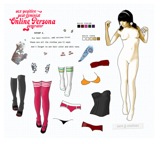

READINGS:
1. Susan Bordo: In the Empire of Images. preface to Unbearable Weight: Feminism, Western Culture and the Body, 2003, 2nd edition (available online here)
2. Katherine Hayles: How We Became Posthuman: Virtual Bodies in Cybernetics, Literature, and Informatics (prologue) http://www.press.uchicago.edu/Misc/Chicago/321460.html
3. Erik Davis’ review of Hayles at http://www.techgnosis.com/hayles.html
***new add from eliza: Angela Davis speaking at York
http://www.youtube.com/watch?v=wO5yPkSB8JU
Discussion: Is code all there is?
Feb. 16th Class# 7 Visitor
Jen Jenson, Associate Professor, Technology and Pedagogy, York University will speak on
“Technology and (feminist) pedagogy: how feminism inflects (and doesn’t) research and pedagogy on gender and digital gameplay”

READINGS:
Bell Hooks: Educating women pp 108-116 Feminist theory: From Margin to Center
Jenson and de Castell: Gender, Simulation and Gaming: Research Review and Redirections
Jenson & de Castell: Girls@Play
Other readings TBA
Feb. 23rd Class# 8 Visitor
Distinguished Professor Dr. Dorothy E. Smith, (Emeritus UBC and currently Adjunct Professor, University of Victoria), will speak on Institutional Ethnography and her pioneering work on developing a ‘sociology for women’. She will be joined by co-researcher Professor Allison Griffiths, York University.
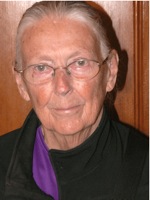
READINGS:
Dorothy Smith: Institutional ethnography
*Please prepare a question based on your reading for this week.
March 2nd Class# 9 Visitors
Dr. Shahrzad Mojab, Professor and Interim Principal of New College, University of Toronto. Dr. Mojab is former Director of the Women and Gender Institute at the University of Toronto (2003-2008). She has done extensive research on women, war, violence and learning, has specialized in Iranian women’s studies, and will discuss her current research in the second half of the class.

Dr. Celia Haig-Brown, Professor in the Faculty of Education at York University, who specializes in Aboriginal education and teaches a graduate research course on ‘decolonizing methodologies’ will show her recent film Pelq’ilc (Comin Home), a collaboration with her niece, award-winning filmmaker Helen Haig-Brown of the Tsilhqot’in Nation during the first half of the class.
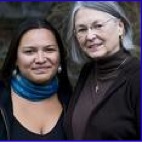
Mojab Readings:
1. Shahrzad Mohab: ‘Post war reconstruction’, Imperialism and Kurdish Women’s NGO’s
2. Shahrzad Mohab: Turning work and lifelong learning inside out: A marxist-feminist attempt
Haig-Brown Readings
1. Decolonizing diaspora
2. Appropriation
Postcolonial Politics of (re-) Engagement:
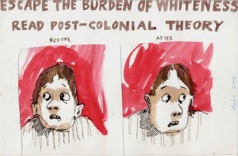
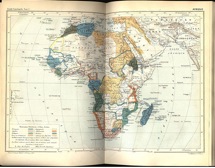

READINGS:
1. Sandoval (2000) Methodology of the Oppressed (select and skim)
2. Mohanty (2003) Feminism without Borders Decolonizing Theory, Practicing Solidarity in Feminist Theory: A Reader (W. Kolmar 2009)
*pls note readings added for LAST week, for Celia Haig Brown---have a look!
March 9th Class# 10 Visitor (Megan Boler)

Boler readings:
Boler: A Pedagogy of Discomfort; Fuss: Essentially Speaking; Hooks: Talking back and TTT; Liston and Garrison; Ellsworth: Why...?; Boler/DeC: Troubling Speech
PLEASE READ ALL the reading for this week’s class on Feminist Pedagogy, come to class with one question from one or more of these readings, as well as be prepared to discuss your ‘take’ on the question I posed last class:
“Imagine you are in charge of deciding whether to discontinue your faculty’s “feminist pedagogy” course, or retain it.
Which will you do? Why?
If retain, what will be on the syllabus?
If abandon, what will replace it?”
March 16th NO CLASS (OISE reading week)
Prepare what you will present to the class for 10-15 minutes on March 23rd!
March 23rd Class#11


Spirited Bodies: The “ground Truth” of Feminist Praxis
“We are confronting today a postsecular realization that
all beliefs are acts of faith, regardless of their propositional content – even,
or especially, when they invoke the superiority of reason, science and technology.
All belief systems contain a hard core of spiritual hope...” Braidotti, p. 12
“...the conditions for political and
ethical agency are not dependent on the current state of the terrain. They
are not oppositional and thus not tied to the present by negation; instead
they are affirmative and geared to creating possible futures. Ethical relations
create possible worlds by mobilizing resources that have been left untapped,
including our desires and imagination. They are the driving forces that
concretize in actual, material relations and can thus constitute a network,
web or rhizome of interconnection with others.” (Braidotti, p16)
In the 10-15 minutes you have to cover your theoretical and practical projects for this class, talk also about your OWN story of ‘whither feminism’, taking up as you are able to the guiding questions, readings, and the various ‘enframings’ of those issues by the women who have visited and spoken to the class.
I will bring wine.
READINGS:
1. The body in collective memory: Frigga Haug et al (translators introduction to Female Sexualization: A Collective Work of Memory, here
2. On Female Body Experience: "Throwing Like a Girl" and Other Essays (Studies in Feminist Philosophy) Iris Marion Young, (OUP, 2005)--select and skim
3. Feminist epistemology after postmodernism: Critiquing science, technology and
globalisation ROSI BRAIDOTTI
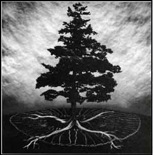
March 30th SUBMIT COURSEWORK
